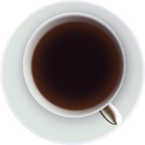 by Avik Chatterjee, MD I’ve never been good about drinking water. During my medical residency, though, I did get good at drinking coffee. But drinking so much coffee and not water (like everyone else seemed to be doing) made me nervous about my hydration status. since I wasn't drinking enough water to begin with, wouldn’t drinking coffee (with the ensuing diuretic effects) make things worse? IV fluids to the resident room, stat! Caffeine is famous for making you pee. But how? Is it just the volume of the coffee consumed? Is it via anti-diuretic hormone (like alcohol)? Actually, caffeine seems to increase urine output by increasing blood flow to the kidneys—via blockade of adenosine receptors on blood vessels there—mice engineered to not have those receptors didn’t diurese in response to caffeine the way that regular mice did (Rieg et al. 2005).
But does caffeine result in dehydration? In 1997, a group of researchers in England took 50 coffee-drinking men and used a crossover study design to see what would happen to total body water, urine volume, and blood and urine chemistry if they drank 4 cups of coffee a day for three days, versus drinking water for three days instead. It turns out that there was no difference in any of the measures of hydration status during the periods of time when the subjects drank coffee versus water (Killer et al. 2014). So drinking coffee regularly won’t dehydrate you. But what about the omnipresent command to drink eight, eight-ounce glasses of water a day? In a 2002 review in the American Journal of Physiology, Heinz Valtin explored the evidence behind the famous directive. What did he find? No evidence, aside from expert opinion from forty years ago (Valtin 2002). What harm could it do to recommend that someone ingest more fluids? Valtin cites data from the Continuing Survey of Food Intakes by Individuals showing that since the 8x8 initiative, water consumption has increased by ~25%, but consumption of soda, alcohol and juice doubled. And as Malik and colleagues found in a meta-analysis, daily intake of such sugary beverages was associated with higher weight gain over time and with a 40% increased relative risk of type 2 diabetes, compared to those who drink those beverages less than once a month (Malik 2010). While the campaign to get people to drink more may not have been the cause for an increase in sugar-sweetened beverage intake, with all the juices and sweetened “energy” and “sports” drinks out there, it’s probably OK if we relax a little with our imperatives that everyone stay hydrated. So, don’t feel guilty about not getting those eight glasses a day. Furthermore, it may be time to tone down the eight-glasses-a-day rhetoric, or to make sure it’s only water that our patients are drinking. Coffee breaks—no sugar, no cream—are OK, too, thank goodness.
2 Comments
Mazen
10/28/2014 07:58:59 am
Interesting post. Glad to learn that coffee doesn't dehydrate!
Reply
Dutta
3/1/2015 08:19:50 am
I sense a certain odor in the urine and the color is more yellow whenever I drink coffee(not a regular drinker of coffee, but tea). Are these signals to be heeded?
Reply
Your comment will be posted after it is approved.
Leave a Reply. |
©2017 WeighingInBlog. All rights reserved. 401 Park Drive, Boston, MA




 RSS Feed
RSS Feed

